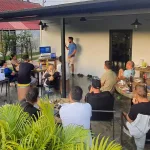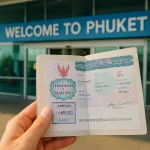Expat Guide to Living in Phuket: A No-Nonsense Look at Life on Thailand’s Largest Island
So you’re thinking about the expat life.
And Phuket’s name keeps popping up.
But let’s be real — you’re not just chasing palm trees and pad Thai.
You’re wondering: Can I actually live there? Will I be bored, broke or burnt out?
And what’s the deal with visas, jobs, health, taxes — and tuk-tuks?
Here’s your unfiltered, honest Expat Guide to Living in Phuket.
ToC
Table of Contents
Why Phuket? Let’s Get into It
Phuket’s more than just another pretty beach.
It’s Thailand’s biggest island, nestled in the Andaman Sea, with nearly 600,000 people, including 115,000 expats.
It’s got energy. Life. Good weather (most of the time). And a rhythm you can fall into if you’re ready to slow things down.
But let’s start with the good stuff that gets people packing:
- World-class beaches: Karon, Kata, Bangtao, Surin — all within reach.
- Strong international community: You’ll find digital nomads, retirees, remote workers and scuba bums.
- Convenient access: Phuket International Airport connects you to Bangkok, Singapore, KL, Doha, and beyond.
- Affordable luxury: For the cost of a poky London flat, you could have a villa with a pool.
Where Expats Actually Live in Phuket
Skip the tourist traps. These are the places you’ll actually want to unpack:
Patong
Love it or hate it, it’s lively.
Expect loud nightlife, Bangla Road madness, and bars stacked on bars. Great for people watching, not great for quiet nights in.
Karon
More chilled, more space, fewer neon lights.
Families like it. The beach is long, and so are the lazy lunches.
Kata
Tucked between touristy and tranquil. Mini-golf, street food, surf culture — a decent pick for first-timers.
Bangtao & Surin
Upscale vibes. Think PRU, the Michelin-starred restaurant. Close to Millionaire’s Mile. Fewer tourists, more golf carts.
Rawai & Nai Harn
Down south. Where more long-stayers settle. Yoga, Muay Thai, Rawai Park, and some of the island’s best sunsets.
→ Read more: Most Instagrammable Spots in Phuket
How Much Does It Cost to Live in Phuket?
Here’s the breakdown, mate.
You can absolutely live on $2,000/month, but lifestyle matters.
On a shoestring:
- Local meals? $2–$4
- Studio flat inland? $400/month
- No frills, no pool, no nonsense
Mid-range lifestyle:
- Apartment near beach? $1,000–$1,500
- Grab food often, gym, brunches, massages
- Monthly budget? $1,800–$2,200
Living lush:
- Private villa with pool? $2,000+
- Dine at PRU? $100 per person
- Luxury gyms, schools, spas, and drivers
→ Looking to stretch your baht? Try: How Cheap is Phuket if You Visit Now
What About Jobs for Foreigners in Phuket?
Brace yourself.
Thailand’s Alien Employment Act is… strict.
Foreigners — “farangs” — can’t just rock up and start working any job. There are over 40 jobs off-limits (think: hairdresser, tour guide, Thai massage therapist).
What can you do?
- Teach English (TEFL helps, but patience helps more)
- Real estate (though you’ll be selling to other expats)
- Work online (remote work, freelancing, ecommerce)
- Run a business (with the right visa + Thai partners)
Avoid trying to wing it on a tourist visa. Thai immigration doesn’t mess around.
Getting a Visa: Thai Bureaucracy 101
Here’s the skinny on how to stay legally:
Tourist Visa Exemption
- 30 days visa-free if you’re from the UK, EU, US
- Can extend another 30 days once
Thai Elite Visa
- Gold: 5 years – ฿900,000 (~$26,600)
- Platinum: More perks, more cost
- No work rights, but easy long-term stay
Retirement Visa
- 50+ years old
- Bank deposit or ฿65,000/month income
Business & Investment Visas
- Start or invest in Thai businesses
- Get a Non-Immigrant B Visa (good for remote work too)
→ Dive deeper here: Guide to Residence in Thailand
Let’s Talk Healthcare
Public care? It’s there, but you’re not gonna love it.
Most expats get private insurance and go to private hospitals — Bangkok Hospital Phuket, Mission Hospital, Dibuk and more.
Expect clean rooms, fast service, and doctors who speak English.
→ Planning for wellness? Bookmark: Best Hospitals in Phuket for Expats
Is Phuket Family-Friendly?
Short answer: Yes.
But here’s what you need to know if you’ve got little ones.
Schools
- International Schools like British International School or HeadStart are top-tier
- Expect fees: ฿600,000–฿900,000/year
- Mid-tier options are cheaper but still not “budget”
Activities
- Phuket’s bursting with stuff for kids
- Dino Park Mini Golf, Splash Jungle Water Park, Phuket Bird Park, and Trickeye Museum
- Loads of weekend adventures
→ Check this goldmine: Top Kids Activities in Phuket
What About Taxes, Then?
Ah, the classic expat question.
Thailand used to ignore foreign income. Not anymore.
From 2024, if you’re a tax resident (183+ days in-country), any money you remit to Thailand can be taxed up to 35%.
But here’s the Jane Austen version:
If one lives frugally, and remits little, one shall remain financially unscathed.
Translation?
Live lean. Keep your money offshore. Use smart banking. You’ll likely pay a minimal amount.
→ Curious about structure? Explore Thailand’s New Tax System
Not All Sunshine and Mango Sticky Rice
Look, Phuket isn’t perfect.
- Traffic is mental in high season
- Visas require effort (and cash)
- Locals don’t all speak English — learn some Thai!
- Rainy season is real (May to October = wet afternoons)
Still, if you can handle monsoons, mosquitos, and messy immigration forms — it’s worth it.
You in or Out?
This isn’t Bali. This isn’t Spain. This isn’t your same-same sunspot.
Phuket’s for those who want tropical chaos and coconut mornings, who can laugh through visa queues and surf the high humidity.
That’s the real secret. That’s why this place gets under your skin.
So, if you’re serious about finding your new home under the Thai sun — this Expat Guide to Living in Phuket is where your journey begins.
Further Reading: Phuket Expat Guide (2025): Live, Work & Thrive on the Island










